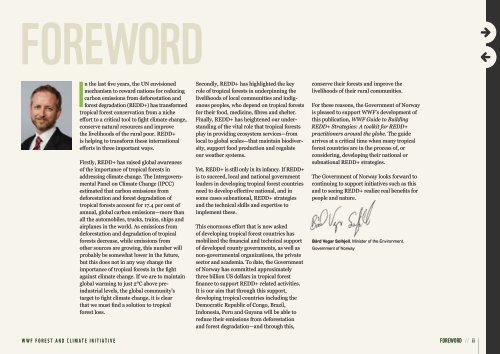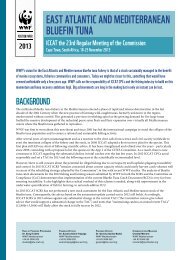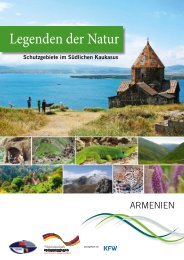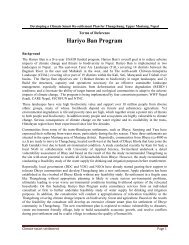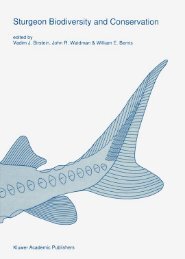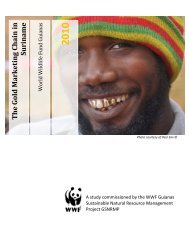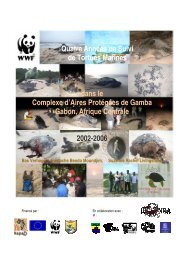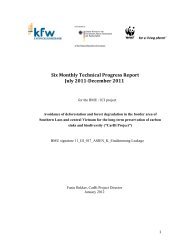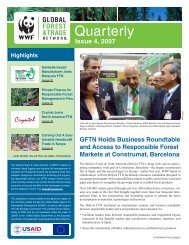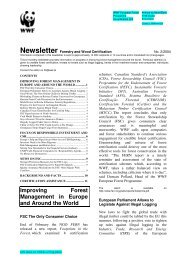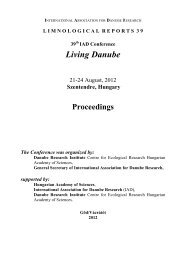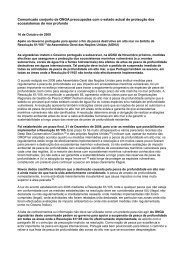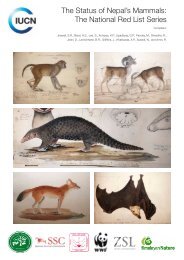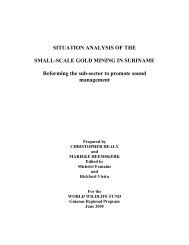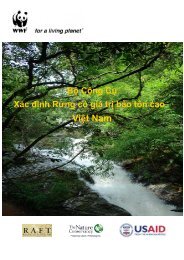WWF Guide to Building REDD+ Strategies
WWF Guide to Building REDD+ Strategies
WWF Guide to Building REDD+ Strategies
Create successful ePaper yourself
Turn your PDF publications into a flip-book with our unique Google optimized e-Paper software.
FOREWORD<br />
In the last five years, the UN envisioned<br />
mechanism <strong>to</strong> reward nations for reducing<br />
carbon emissions from deforestation and<br />
forest degradation (<strong>REDD+</strong>) has transformed<br />
tropical forest conservation from a niche<br />
effort <strong>to</strong> a critical <strong>to</strong>ol <strong>to</strong> fight climate change,<br />
conserve natural resources and improve<br />
the livelihoods of the rural poor. <strong>REDD+</strong><br />
is helping <strong>to</strong> transform these international<br />
efforts in three important ways.<br />
Firstly, <strong>REDD+</strong> has raised global awareness<br />
of the importance of tropical forests in<br />
addressing climate change. The Intergovernmental<br />
Panel on Climate Change (IPCC)<br />
estimated that carbon emissions from<br />
deforestation and forest degradation of<br />
tropical forests account for 17.4 per cent of<br />
annual, global carbon emissions—more than<br />
all the au<strong>to</strong>mobiles, trucks, trains, ships and<br />
airplanes in the world. As emissions from<br />
deforestation and degradation of tropical<br />
forests decrease, while emissions from<br />
other sources are growing, this number will<br />
probably be somewhat lower in the future,<br />
but this does not in any way change the<br />
importance of tropical forests in the fight<br />
against climate change. If we are <strong>to</strong> maintain<br />
global warming <strong>to</strong> just 2°C above pre-<br />
industrial levels, the global community’s<br />
target <strong>to</strong> fight climate change, it is clear<br />
that we must find a solution <strong>to</strong> tropical<br />
forest loss.<br />
Secondly, <strong>REDD+</strong> has highlighted the key<br />
role of tropical forests in underpinning the<br />
livelihoods of local communities and indigenous<br />
peoples, who depend on tropical forests<br />
for their food, medicine, fibres and shelter.<br />
Finally, <strong>REDD+</strong> has heightened our understanding<br />
of the vital role that tropical forests<br />
play in providing ecosystem services—from<br />
local <strong>to</strong> global scales—that maintain biodiversity,<br />
support food production and regulate<br />
our weather systems.<br />
Yet, <strong>REDD+</strong> is still only in its infancy. If <strong>REDD+</strong><br />
is <strong>to</strong> succeed, local and national government<br />
leaders in developing tropical forest countries<br />
need <strong>to</strong> develop effective national, and in<br />
some cases subnational, <strong>REDD+</strong> strategies<br />
and the technical skills and expertise <strong>to</strong><br />
implement these.<br />
This enormous effort that is now asked<br />
of developing tropical forest countries has<br />
mobilized the financial and technical support<br />
of developed county governments, as well as<br />
non-governmental organizations, the private<br />
sec<strong>to</strong>r and academia. To date, the Government<br />
of Norway has committed approximately<br />
three billion US dollars in tropical forest<br />
finance <strong>to</strong> support <strong>REDD+</strong> related activities.<br />
It is our aim that through this support,<br />
developing tropical countries including the<br />
Democratic Republic of Congo, Brazil,<br />
Indonesia, Peru and Guyana will be able <strong>to</strong><br />
reduce their emissions from deforestation<br />
and forest degradation—and through this,<br />
conserve their forests and improve the<br />
livelihoods of their rural communities.<br />
For these reasons, the Government of Norway<br />
is pleased <strong>to</strong> support <strong>WWF</strong>’s development of<br />
this publication, <strong>WWF</strong> <strong>Guide</strong> <strong>to</strong> <strong>Building</strong><br />
<strong>REDD+</strong> <strong>Strategies</strong>: A <strong>to</strong>olkit for <strong>REDD+</strong><br />
practitioners around the globe. The guide<br />
arrives at a critical time when many tropical<br />
forest countries are in the process of, or<br />
considering, developing their national or<br />
subnational <strong>REDD+</strong> strategies.<br />
The Government of Norway looks forward <strong>to</strong><br />
continuing <strong>to</strong> support initiatives such as this<br />
and <strong>to</strong> seeing <strong>REDD+</strong> realize real benefits for<br />
people and nature.<br />
Bård Vegar Solhjell, Minister of the Environment,<br />
Government of Norway<br />
<strong>WWF</strong> FOREST AND CLIMATE INITIATIVE FOREWORD // ii


